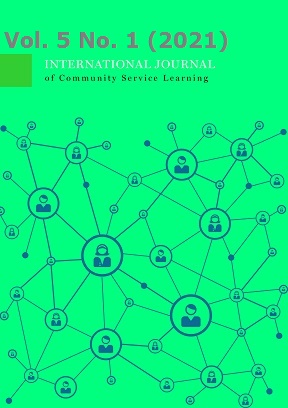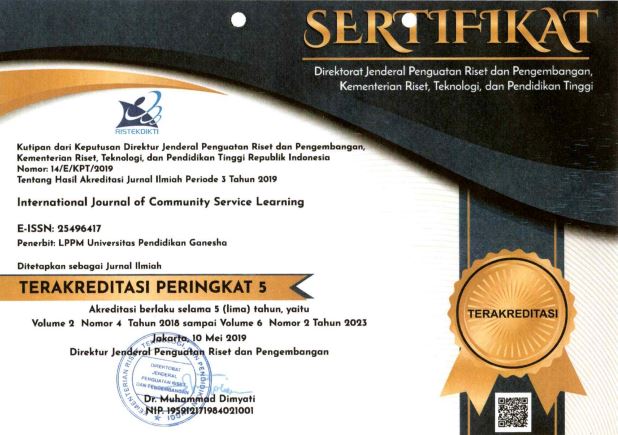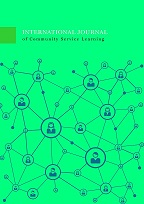Online Learning Implementation Training for Teachers of SDN Bangetayu Kulon
DOI:
https://doi.org/10.23887/ijcsl.v5i1.30762Kata Kunci:
Online learning, online assessment, online quiz, elementary schoolAbstrak
During the pandemic, elementary school teachers have experienced difficulties in implementing a full online learning system because this was their first time to do it. They have not fully mastered various online learning and assessment method, so they mostly used Whatsapp as the main platform. Those problems were also faced by the teachers of SD Bangetayu Kulon. The purpose of this service is to improve the knowledge and skills of teachers towards bold learning. The subjects of this service are elementary school teachers, totaling 8 people. The training was implemented using several methods, such as lecturing, question and answer, and the direct practice method. The data were collected using observation method. The results showed that all teachers have succeeded to create and manage an online class in Edmodo and conducting online assessments by using Kahoot! and Quizizz. After this training, they will be able to conduct a more organized and interesting online learning using various platforms.
Referensi
Andel, S. A., de Vreede, T., Spector, P. E., Padmanabhan, B., Singh, V. K., & Vreede, G. J. de. (2020). Do social features help in video-centric online learning platforms? A social presence perspective. Computers in Human Behavior, 113(April), 106505. https://doi.org/10.1016/j.chb.2020.106505.
Azizah, A. (2020). Pelatihan Pembelajaran Daring Dimasa Pandemi Covid-19 Untuk Guru- Guru Sd Negeri 3 Melayu Muara Teweh Online Learning Training During the Covid 19 Pandemic for Teachers Sd Negeri 3 Malay Muara Teweh. BAKTI BANUA : Jurnal Pengabdian Kepada Masyarakat, 1(2), 78–83. https://ejurnal.stimi-bjm.ac.id/index.php/BBJM/.
Balasubramanian, K., Jaykumar, V., & Fukey, L. N. (2014). A Study on “Student Preference towards the Use of Edmodo as a Learning Platform to Create Responsible Learning Environment.” Procedia - Social and Behavioral Sciences, 144, 416–422. https://doi.org/10.1016/j.sbspro.2014.07.311.
Chaiyo, Y., & Nokham, R. (2017). The effect of Kahoot, Quizizz and Google Forms on the student’s perception in the classrooms response system. 2017 International Conference on Digital Arts, Media and Technology (ICDAMT), 178–182. https://doi.org/10.1109/ICDAMT.2017.7904957.
Cohen, D., & Sasson, I. (2015). Journal of Technology and Science Education. Journal of Technology and Science Education, 5(3), 184–193.
Costley, J., & Lange, C. H. (2017). ideo lectures in e-learning: Effects of viewership and media diversity on learning, satisfaction, engagement, interest, and future behavioral intention. Interactive Technology and Smart Education, 14(1), 14–30. https://doi.org/10.1108/ITSE-08-2016-0025.
Daniel, S. J. (2020). Education and the COVID-19 pandemic. Prospects, 49(1–2), 91–96. https://doi.org/10.1007/s11125-020-09464-3.
Diki, D. (2013). International Collaboration of Distance Learning Universities for Online Learning in Indonesia. Lux, 2(1), 1–8. https://doi.org/10.5642/lux.201301.12.
Dong, C., Cao, S., & Li, H. (2020). Young children’s online learning during COVID-19 pandemic: Chinese parents’ beliefs and attitudes. Children and Youth Services Review, 118(June), 105440. https://doi.org/10.1016/j.childyouth.2020.105440.
Garrison, D. R. (2017). E-learning in the 21st century: A community of inquiry framework for research and practice (Third ed.). Routledge.
Hudha, M. N., Chaeruman, U. A., Aji, S. D., Huda, C., Yusro, A. C., Kumala, F. N., Wartono, W., Nandiyanto, A. B. D., & Abdullah, A. G. (2018). SPADA: Online learning between universities of PGRI Indonesia. MATEC Web of Conferences, 197, 1–6. https://doi.org/10.1051/matecconf/201819703002.
Hussein, E., Daoud, S., Alrabaiah, H., & Badawi, R. (2020). Children and Youth Services Review Exploring undergraduate students ’ attitudes towards emergency online learning during COVID-19 : A case from the UAE. Children and Youth Services Review, 119(August), 105699. https://doi.org/10.1016/j.childyouth.2020.105699.
Hwang, G. J., Wang, S. Y., & Lai, C. L. (2020). Effects of a social regulation-based online learning framework on students’ learning achievements and behaviors in mathematics. Computers and Education, 160, 104031. https://doi.org/10.1016/j.compedu.2020.104031.
Irawan, A. W., Dwisona, D., & Lestari, M. (2020). Psychological Impacts of Students on Online Learning During the Pandemic COVID-19. KONSELI : Jurnal Bimbingan Dan Konseling (E-Journal), 7(1), 53–60. https://doi.org/10.24042/kons.v7i1.6389.
Kattoua, T., Al-Lozi, M., & Alrowwad, A. (2013). A Review of Literature on Knowledge Management using ICT in Higher Education. International Journal of Business Management and Economic Research (IJBMER), 4(1), 62–67.
Kkese, E. (2020). McGurk effect and audiovisual speech perception in students with learning disabilities exposed to online teaching during the COVID-19 pandemic. Medical Hypotheses, 144(July), 110233. https://doi.org/10.1016/j.mehy.2020.110233.
Lage-Cala, S., Folgueras-Díaza, M. B., Alonso-Hidalgoa, M., García-Menéndezb, D., & Fernández-Garcíab, F. J. (2020). Investigation of the effectiveness of online learning tools for energy performance certificates preparation. Energy Reports, 6, 609–614. https://doi.org/10.1016/j.egyr.2019.09.034.
Manhas, P. S. (2017). Strategic e-learning models in brand building of educational institution. IV Международной Заочной (Электронной) Научной Конференции, Посвященной 60-Летию Филологического Факультета БашГУ, 15–16.
Mardawani, M., Fusnika, F., & Hartini, A. (2020). Pelatihan Pembelajaran Daring Google Classroom Bagi Guru Di Smp Negeri 6 Sintang. JURNAL PEKAN : Jurnal Pendidikan Kewarganegaraan, 5(2), 148–156. https://doi.org/10.31932/jpk.v5i2.935.
Nashr, J. A. (2020). Ini instruksi Ganjar untuk aturan belajar di rumah karena Corona. 16 Maret.
Oktafia, I. H., & Wulandari, S. S. (2020). Pembelajaran Daring Sebagai Upaya Study From Home (SFH) Selama Pandemi Covid 19. Jurnal Pendidikan Administrasi Perkantoran, 8(3). https://doi.org/10.1093/fampra/cmy005.
Parker, P. C., Perry, R. P., Chipperfield, J. G., Hamm, J. M., & Pekrun, R. (2018). An attribution-based motivation treatment for low control students who are bored in online learning environments. Motivation Science, 4(2), 177–184. https://doi.org/10.1037/mot0000081.
Pujiyanti, D., & Mulyawati, I. (2021). Pelatihan Penggunaan Media Pembelajaran Berbasis Online Bagi Guru Terdampak Covid-19 di SMPN 126 Jakarta. Jurnal Solma, 10(01), 170–178. https://journal.uhamka.ac.id/index.php/solma/article/view/5028/2272
Purnawarman, P., Susilawati, & Sundayana, W. (2016). The use of Edmodo in teaching writing in a blended learning setting. Indonesian Journal of Applied Linguistics, 5(2), 242–252. https://doi.org/10.17509/ijal.v5i2.1348.
Rahardjo, D., Sumardjo, Lubis, D. P., & Harijati, S. (2016). Internet access and usage in improving students’ self-directed learning in Indonesia open university. Turkish Online Journal of Distance Education, 17(2), 30–41. https://doi.org/10.17718/tojde.90196.
Robianto, R. (2020). Pengembangan Media Ajar Berbasis Cross-Platform. 7(4), 247–255.
Rusli, R., Rahman, A., & Abdullah, H. (2020). Student perception data on online learning using heutagogy approach in the Faculty of Mathematics and Natural Sciences of Universitas Negeri Makassar, Indonesia. Data in Brief, 29, 105152. https://doi.org/10.1016/j.dib.2020.105152.
Sabarua, J. O., Patalatu, J. S., & Besare, S. D. (2020). Pelatihan Pembelajaran Daringbagi Guru-Guru Sekolah Dasar Guna Meningkatkan Literasi Digital Di Masa Pandemi Covid-19. Jurnal Abdimas Ilmiah Citra Bakti, 1(2), 147–155. https://doi.org/10.38048/jailcb.v1i2.122.
Salas-Morera, L., Arauzo-Azrofa, A., & García-Hernández, L. (2012). Análisis de los cuestionarios online como herramientas de enseñanza y evaluación. Revista de Tecnología y Educación Científica, 2(1), 39–45.
Sari, E. R. (2012). Online learning community: a case study of teacher professional development in Indonesia. Intercultural Education, 23(1), 63–72. https://doi.org/10.1080/14675986.2012.664755.
Spanjers, I. A. E., Könings, K. D., Leppink, J., Verstegen, D. M. L., de Jong, N., Czabanowska, K., & van Merriënboer, J. J. G. (2015). The promised land of blended learning: Quizzes as a moderator. Educational Research Review, 15, 59–74. https://doi.org/10.1016/j.edurev.2015.05.001.
Sriyanti, I., Muslim, M., & Yusup, M. (2015). Pelatihan Pembuatan Media Pembelajaran Berbasis E-Learninng Bagi Guru SMA Srijaya Negara Palembang. Jurnal Inovasi Dan Pembelajaran Fisika, 2(1), 12–18.
Unduhan
Diterbitkan
Cara Mengutip
Terbitan
Bagian
Lisensi

International Journal of Comunnity Service Learning is licensed under a Creative Commons Attribution-ShareAlike 4.0 International License.













